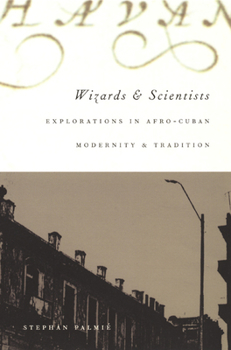Wizards and Scientists: Explorations in Afro-Cuban Modernity and Tradition
Select Format
Select Condition 
Book Overview
In Wizards and Scientists Stephan Palmié offers a corrective to the existing historiography on the Caribbean. Focusing on developments in Afro-Cuban religious culture, he demonstrates that traditional Caribbean cultural practices are part and parcel of the same history that produced modernity and that both represent complexly interrelated hybrid formations. Palmié argues that the standard narrative trajectory from tradition to modernity, and from passion to reason, is a violation of the synergistic processes through which historically specific, moral communities develop the cultural forms that integrate them. Highlighting the ways that Afro-Cuban discourses serve as a means of moral analysis of social action, Palmié suggests that the supposedly irrational premises of Afro-Cuban religious traditions not only rival Western rationality in analytical acumen but are integrally linked to rationality itself. Afro-Cuban religion is as "modern" as nuclear thermodynamics, he claims, just as the Caribbean might be regarded as one of the world's first truly "modern" locales: based on the appropriation and destruction of human bodies for profit, its plantation export economy anticipated the industrial revolution in the metropolis by more than a century. Working to prove that modernity is not just an aspect of the West, Palmié focuses on those whose physical abuse and intellectual denigration were the price paid for modernity's achievement. All cultures influenced by the transcontinental Atlantic economy share a legacy of slave commerce. Nevertheless, local forms of moral imagination have developed distinctive yet interrelated responses to this violent past and the contradiction-ridden postcolonial present that can be analyzed as forms of historical and social analysis in their own right.
Format:Paperback
Language:English
ISBN:0822328429
ISBN13:9780822328421
Release Date:March 2002
Publisher:Duke University Press
Length:416 Pages
Weight:1.45 lbs.
Dimensions:1.1" x 6.2" x 9.3"
Customer Reviews
1 rating
Amazing journey into the "modern" colonial experience
Published by Thriftbooks.com User , 22 years ago
This book is an examination of a process that took place in urban areas of colonial Cuba. Palmié discusses these transformations through a Foucauldian lens, especially the transition to an established judicial system which treated Afro-Cuban subjects as "idolatrous" and "superstitious" within an irrational system of medical and scientific "rationalist" bases of race and gender difference. Palmié discusses the same moves toward "modernity" that interest other authors (Klor de Alva, Pamela Voekel), and calls this process Atlantic Modernity. Basically, the heterogenous forces of the Catholic church, capitalist sugar production, the slave trade, the rise of the penal system, etc. all serve as mechanisms of control and subjugation (most of these controls had already been put into place through centuries of enforced labor and "conversion" imposed by the Spanish conquerors.Tracing one famous character from history (Jose Antonio Aponte), Palmie establishes the modern structures of power during this period by locating one of the primary places of this transition: not only in the New World of colonial power, but within the very structure of religion itself. "Modernity" has typically been assigned to the rise of Protestant individualism (as in Max Weber's famous argument) and capitalist means of mechanization and mass production. But Palmié makes an argument for the "modernity" of Afro-Cuban (namely Africans adapting to the transatlantic experience) religious structures.





